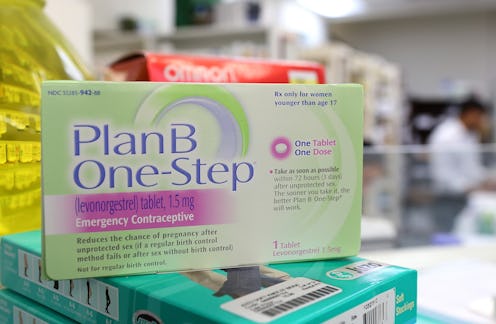News
More Colleges Are Installing This Machine To Improve Emergency Contraception Access

Before Yale University students head out on winter break, an important new feature will be added to their campus. Yale will have an emergency contraception vending machine soon, adding it to the growing list of colleges offering students quick and easy access to the morning after pill.
As the university's newspaper, the Yale Daily News, described, the "wellness to go" vending machine will be installed in the school's Sillman Good Life Center. It will contain emergency contraception, along with lube, condoms, and several other over-the-counter medicines. The paper reported that emergency contraception in the new vending machine will be priced similarly to or lower than drug store rates for the product.
Yale College council senator Ileana Valdez explained to NBC 10 News that students have been advocating for the installation of an emergency contraception vending machine because many on campus cannot easily walk to a pharmacy. "This idea took off on campus because most of the students don't have cars," she said. "... So the nearest pharmacy is a pretty long walk away, especially with the installation of the new colleges."
Valdez also told the Yale Daily News that the goal of the vending machine is to give students more agency in their health decisions through increased accessibility to health care products. "The point of this is to make Plan B more accessible and to make medications in general more accessible,” Valdez asserted to the paper.
Yale is not the first university to offer emergency contraception vending machine services on campus. As The Hill reported, the University of California's school system has similar vending machines for students. Other private schools, like Brandeis University, Pomona College, Stanford University, and more, have installed these machines as well.
Back in September 2017, the New York Times reported on the arrival of these machines at various universities in California. As the paper explained, these schools opted to install the machines because students were finding it difficult to access emergency contraception during times when various universities' health centers were closed. Moreover, nearby pharmacies sometimes failed to stock the product, making accessibility even more difficult.
The New York Times also pointed out that price was a barrier for many students seeking the morning after pill. Therefore, some universities, like Stanford, opted to use the vending machines to sell generic versions of emergency contraception, which typically retail for around half the price of similar non-generic products.
The Yale Daily News reported that Yale spokeswoman Karen Peart indicated that emergency contraception is available for free at university health centers 24 hours a day. However, the paper noted that there is a lot of confusion among students about if and how they can access emergency contraception through Yale's health services. Thus, the forthcoming vending machine seems to offer a quicker and more private solution for students seeking the morning after pill. Valdez, the aforementioned council senator, echoed these sentiments when speaking with NBC 10 News:
[The vending machine] gets rid of the fear that one might have going to the health center and having to talk [to] someone especially if this is something that's happening late at night.
Overall, Yale's emergency contraception vending machine will aim to make it easier for students to access important and time-sensitive reproductive health care medication. Time will tell if other schools join Yale and several others around the country in their quest to make emergency contraception more readily available for students.